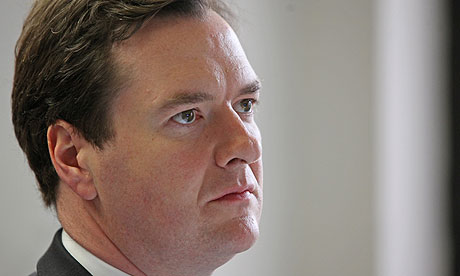UK economy's fall into recession deeper than expected
Contraction of 0.3%, coupled with more bad news from the eurozone, increases pressure on government to intervene to boost economic growth

The prospect of fresh action to boost the flagging British economy loomed larger on Thursday after official figures showed a steeper fall in activity than previously thought and the crisis-hit eurozone drifted towards a deeper slump.
Labour seized on data from the Office for National Statistics (ONS) showing that gross domestic product declined by 0.3% in the first three months of 2012 as evidence that Britain is ill-prepared to withstand a deterioration in the rest of Europe over the coming months.
The ONS had originally pencilled in a 0.2% drop in output for the first quarter but said that the downturn in the UK's construction sector was even more pronounced than it had previously projected. Britain's economy was 0.1% smaller at the end of the three months to March than it was a year earlier, the ONS added.
A survey of business activity in the eurozone showed that the worsening of the debt crisis looks likely to have a marked impact on business activity. The purchasing managers' index – a forward-looking guide to sentiment in the manufacturing and service sectors – slid to a 35-month low of 45.9 in May, from 46.7 in April and 49.1 in March. Manufacturing was particularly weak, with activity contracting at the fastest rate for nearly three years while services activity shrank at the fastest rate for seven months.
Meanwhile, a key measure of German business confidence – the Ifo index – revealed that fears about the break-up of the single currency are starting to cast a shadow over Europe's biggest economy. Business confidence fell from 109.9 to 106.9, reversing all its gains of the past five months.
The shadow chancellor, Ed Balls, said: "It's now clear that this is a recession made in Downing Street by this government's failed policies. Despite all the problems in the euro area, France, Germany and the eurozone as a whole have so far avoided recession and only exports to other countries stopped us going into recession a year ago. The result is that Britain is now in a weaker position if things get worse in the eurozone in the coming months."
According to the ONS, the downturn in the first quarter was of the same magnitude as the contraction in the final quarter of 2011, undermining hopes that the economy was moving towards recovery.
Deputy prime minister Nick Clegg suggested earlier this week that the coalition plans to expand its policy of credit easing, using government guarantees to kickstart spending on infrastructure and housing to boost the economy. According to the ONS, construction output declined by 4.8% in the first three months of the year, after a 0.2% decline in the fourth quarter of 2011, helping to explain the government's change of heart about pumping fresh cash into building projects.
"Over the past 18 months, the economy has experienced a mild contraction in output. This reflects global economic headwinds as well as domestic economic conditions such as the impact of continuing high rates of inflation in the UK," the ONS said.
With the extra bank holiday for the Queen's diamond jubilee expected to depress economic output in the second quarter of the year, as workers down tools and fire up their barbecues, analysts believe it will be autumn at the earliest before the UK emerges from recession.
However, as Sir Mervyn King, the governor of the Bank of England, has stressed, events in the eurozone, where leaders are battling to contain the impact of the political paralysis in Greece, present a major risk to the outlook in the weeks ahead.
David Miles, the one member of the Bank's monetary policy committee (MPC) to vote for further quantitative easing this month, said: "No one on the MPC feels comfortable with the prolonged and substantial overshoot of inflation above its target level. But that does not mean bringing inflation back to target very rapidly is the best thing to do.
"In a situation where weak demand is likely to be having a negative impact upon productive capacity, the cost of having a tighter monetary policy to bring inflation back to target fast will be some long-lasting damage to incomes."
Howard Archer, of consultancy IHS Global Insight, described the growth figures as "very disappointing".
SOURCE: CLICK HERE to read more
Leave a comment and / or appreciate the article!
CLICK HERE to read more:» http://www.radio-elshaday.de/
CLICK HERE to read more:» http://www.radio-megapower.de/
CLICK HERE to read more:» http://christliche-radiosender.blogspot.com/
CLICK HERE to read more:» http://radiomegapower-nonstop.blogspot.de/
Posted by: Daniel Ioan Notar *DJ_DANY*
Keine Kommentare:
Kommentar veröffentlichen